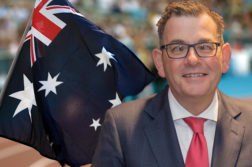So, John Howard gave a speech.
You’d be forgiven for wondering why the media is so worked up over a private speech given to some bankers at Westpac. John Howard looks back fondly at his four terms in office? Gosh. The former PM thinks there should be more Chinese investment? Oh, okay. He believes WorkChoices was a good policy, and there "is no reason" that Australia shouldn’t return to his system of individual contracts? Shock.
It’s not as though Howard has been silent since his election loss in late 2007. He has written a book, given innumerable speeches and lectures, and toured the world to the applause of friendly conservatives. Nor should we be surprised that he still supports WorkChoices. Howard is an industrial relations hardliner, who built a career on his strong hawkish credentials.
So is the widespread coverage given to the former PM’s remarks about WorkChoices justified? No, not really.
But that doesn’t mean it’s not creating problems for Tony Abbott. The Opposition Leader has long described WorkChoices as "dead, buried and cremated". He took that position to the last election. Most thought the Liberal party would continue with it, even if only for reasons of political expediency.
Now the WorkChoices zombie is rising. There’s long been considerable skepticism about the depth of the Coalition’s conversion on industrial relations, given the long-standing beliefs of most conservative politicians and the strenuous opposition to the government’s Fair Work Act by many in the business lobby. The unions and the Labor Party have also suggested assiduously that an incoming Abbott government will abandon Labor’s model and reinstate WorkChoices as soon as it can.
In his speech, Howard reportedly argued that WorkChoices was not the real reason for the downfall of his government. He is deluding himself. No single issue ever decides a federal election, but there is no doubt that WorkChoices was a huge negative for the Coalition in 2007. Polling during 2007 and the comprehensive exit polling undertaken by the Australian Election Study suggests industrial relations was a major vote changer. In the AES, industrial relations was cited as the single biggest issue by voters, and Labor led the Coalition by 20 points.
Abbott solved this problem in 2010 by arguing that the Coalition had heard the message of 2007 and had moved on. Now, thanks to the remarks of his former PM, the media has been given an opportunity to sow further doubts about that pledge.
The media is perhaps the most interesting actor in this scenario. We may be at an inflection point in the national debate, because the tone of media coverage is starting to turn negative on the Opposition Leader. That’s something he has hasn’t really had to contend with so far.
For most of his time as Opposition Leader, Tony Abbott has enjoyed relatively favourable coverage. Abbott took up the cudgels at a time when there was widespread animosity towards Kevin Rudd’s style of leadership, including from within the media, which had been hearing about Rudd’s dysfunctional arrogance from seemingly everyone in the ALP and the public service, and could anyway see it with their own eyes at every press conference.
In contrast, Abbott ran an efficient media operation. He gave great photo ops, and when the cameras rolled he could be relied on to deliver a simple message that cut through the noise of political combat. Consequently, media coverage of Abbott tended to take him at face value, giving him plenty of airtime to voice his well-crafted lines.
Who can really say why these things happen, but at some point many in the national political media seem to have decided that the Opposition Leader was getting altogether too easy a run. Perhaps it has been the minor uptick in Labor’s dismal poll figures, which have improved from catastrophic to merely disastrous in recent weeks.
Calls for greater scrutiny have long been heard in the blogosphere. But it was a Barrie Cassidy op-ed in The Drum that appears to have changed a few minds. Days later, the ABC’s Leigh Sales humiliated Abbott on national television. In a remarkable interview, she forced Abbott to admit he hadn’t read a BHP media release that contradicted his claims blaming the carbon tax on the shelving of the Olympic Dam development. A visibly unsettled Abbott was then unable to explain what questions Prime Minister Julia Gillard should answer over the union campaign fund she set up at Slater and Gordon back in the 1990s.
The interview was widely shared and posted across social media. As his opinion poll dissatisfaction figures have long indicated, the Opposition Leader has no shortage of voters happy to revel in his discomfort.
On a good day, Abbott is the most effective political communicator in the country. But doubts linger over the depth of his command of policy detail, and his checkered past provides plenty of examples of gaffes, stumbles and meltdowns. Who can forget that disastrous day during the 2007 election campaign, when he swore at Nicola Roxon and then attacked asbestos campaigner Bernie Banton?
In contrast, Julia Gillard is surprising us again with her tenacity. The pressure of high office has messed with many a political mind, but the Prime Minister seems inured to the constant criticism — indeed, she seems to thrive on it. Her recent, extraordinary, media conference dealing with those Slater and Gordon allegations was another example. Staying on her feet to take literally every question the press gallery could throw at her, the Prime Minister put this incipient scandal to bed.
Gillard certainly struggles when it comes to delivering set-piece addresses. But on her feet, in the heat of battle, she has a sharp mind and a fair streak of understated wit to accompany it. The contrast between a prime minister comfortable speaking off the cuff, and an opposition leader who has previously admitted he makes things up under pressure, is sharpening.
This media dynamic is helping to drive the current interest in some recycled remarks by a former prime minister. Abbott is finding that when the media story is about you, simply pointing to the shortcomings of the other team won’t always cut through.
Other dynamics are at play. The Coalition’s relentless attacks on the carbon tax are starting to seem baseless, with voters pleasantly surprised that the sky is not falling after all (the citizens of Whyalla must be particularly pleased). Inflation is running below 2 per cent, so it’s not surprising that few consumers are feeling a carbon price sting.
And the Coalition still doesn’t have a lot of policy detail released. That’s normal this far out from an election, but it also plays into Labor’s portrayal of the Coalition as unnecessarily negative. It doesn’t help that many of the Coalition’s policies are negative, whether it be on the carbon tax, or its pledge to oppose the Gonski schools funding reforms. And unpopular austerity measures from conservative state premiers may also be reflecting back on the Coalition federally.
Taken together, these dynamics suggest that all is not lost for the Gillard government. At the very least, we can say that a bit of precious momentum seems finally to be rolling Labor’s way.
Progressive types shouldn’t get too excited, though. An election held last weekend would have delivered a 1996-style landslide to the Coalition. Labor remains deeply unpopular across much of the country, and so does the Prime Minister. A little bit of knowledge can be a dangerous thing, they say. So too can a little bit of hope.
Donate To New Matilda
New Matilda is a small, independent media outlet. We survive through reader contributions, and never losing a lawsuit. If you got something from this article, giving something back helps us to continue speaking truth to power. Every little bit counts.



